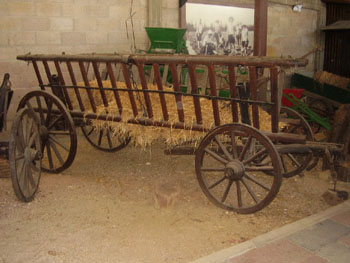we first went up to kibbutz yifat in the jezreel valley located in the lower galilee region, to visit the pioneer settlement museum, covering the period of the third alliya immigration (1919-1923).
the museum presentation was socialism meets zionism meets the wild-wild-west, with interesting displays of such things as
the dining hall
.jpg)
wagons

and tents (each having three people - even if two of them were part of a couple, taking that spirit of communitarianism to the next level...)

while the museum glossed over some of the thornier aspects of the settlement of the land (i.e., the relationship between the kibbutznik refugees from eastern europe, and the arab folks already living on the land, and whether this dynamic factored into the socialist experiment taking place), our learning was enhanced by a tour led by muki tzur, an very energetic and talkative kibbutz historian who lived through that time period.
we later visited with younger 20 and 30-something members of urban kibutzim, a growing israeli phenomenon since the 1980s. each "urban kibbutz", is made up of several smaller groups, known as kvutzot. we learned about one, kvutzat yovel in migdal emek, whose members pool all of their money into one bank account, figure out how to observe judaism on their own terms, celebrate their connections to israel, and work together as a non-profit, advocating for equal access to education for all citizens of israel.
after many interesting discussions, my open question right now is whether and to what degree this model for an "intentional jewish social justice community" needs to be connected to zionism and the modern state of israel, and the ways in which it can be equally successful in the diaspora.
No comments:
Post a Comment